This morning was the first meeting of a new Hebrew reading group that fellow colleagues and I started up. What was new for me was singing in Hebrew. Here are some audio clips from today: Psalm 133:1 and Lamentations 5:21.
We decided to read an Old Testament book that is usually one of the first to be translated. This whittled down the choice to three books: Genesis, Ruth and Jonah. I suggested that we go with the OT’s favorite Moabitess, Ruth. Who doesn’t enjoy a good love story?
After almost two hours of reading and discussing, we got to v. 6, which reads, “Then she [Naomi] arose along with her daughters-in-law to return from the field of Moab, because while in the territory of Moab she had heard that the Lord had paid attention to his people by providing food for them” (Ruth 1:6 CEB). My experienced colleagues–and when I say that, I mean colleagues who have been in Africa longer than I’ve been alive–they mentioned how the word “food” here can also be translated bread, but in this context it’s clearly referring to food in general. In the settings where they’ve worked, the local word for food usually conjures up the image of a cornmeal foufou ball. Here’s a picture of a ball of foufou that I had recently while out in a village. On its own it doesn’t have much flavor but dip it in a little sauce and it’ll fill you right up.
I asked my colleagues if one could say that Jesus is the foufou of life, still thinking about my Behold, the Chicken of God experience a couple of months back. The response I got back is one worth remembering:
You would have to ask the community. Good translations can be unacceptable. You cannot use key terms that the churches reject.
If we define a good translation as one that accurately represents the original meaning, then perhaps foufou of life would be a good translation for folks for whom foufou fills the same role (pun on bread “roll”!) as bread did in Jesus’ day. But if one such “good” translation were rejected by the Church as unacceptable, then it must be reconsidered.
Thus we see that the role of the community in Bible translation is huge.
In their book Translating the Bible into Action, Harriet and Margaret Hill share a great story that highlights the same point (p. 17):
While translation is underway, leaders from all the churches need to be involved in decisions about translating key biblical terms, such as Holy Spirit, grace, the cross, repentance, glory, eternal life, God, angels…
It may take a long time, much discussion, and careful study to reach agreement… Often a compromise is the only solution. For example, in a large language in the Democratic Republic of Congo, the Catholics and the Protestants had different terms for Holy Spirit. They knew they had to have one Bible for everyone to use, so they had to come to an agreement on the term used in the translation. After much discussion, their solution was to take the word for ‘holy’ from the Catholics and the word for ‘Spirit’ from the Protestants! Ten years later, no one remembered the original terms.

CommentsOnToast